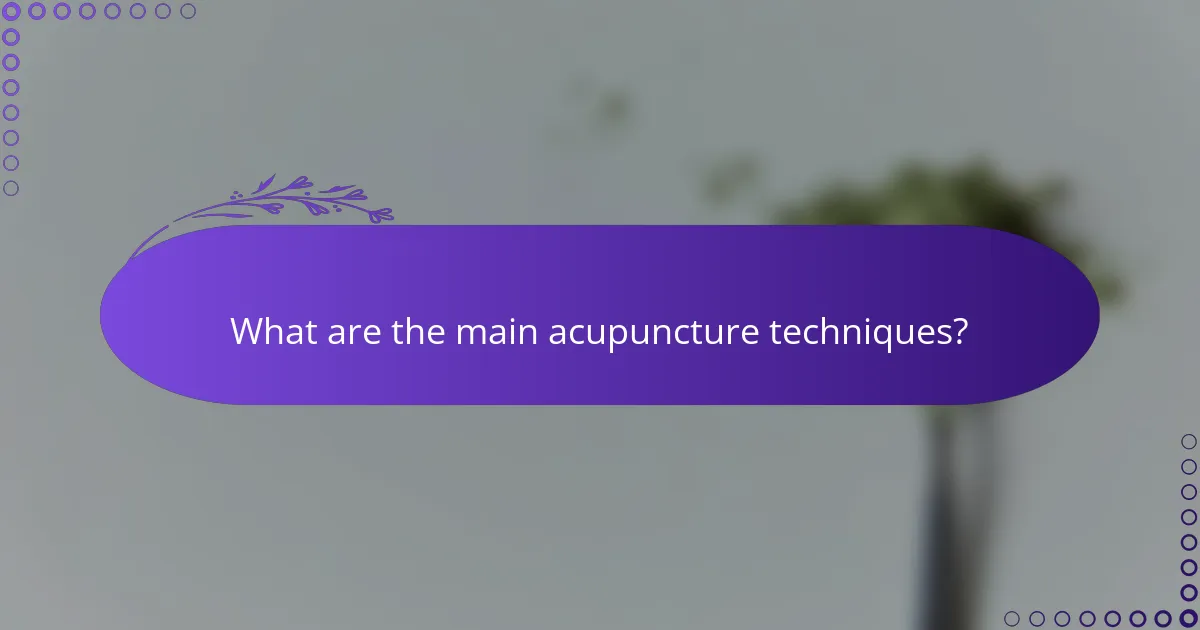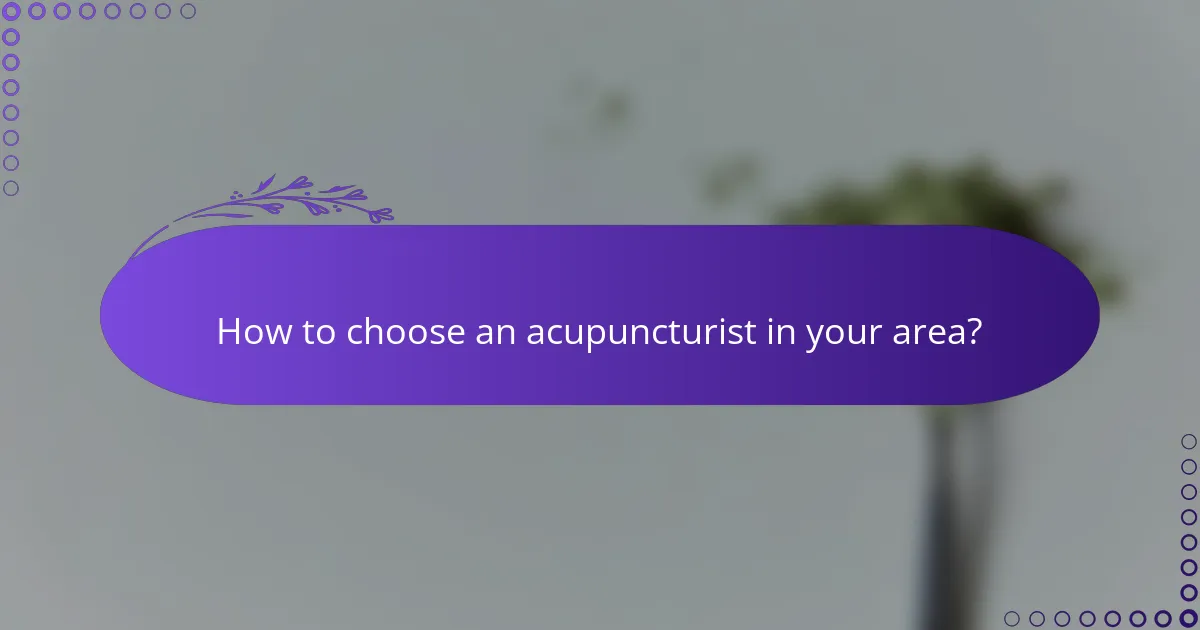Acupuncture is a time-honored practice that enhances health by addressing various physical and mental health issues through the strategic insertion of fine needles into specific points on the body. With techniques such as traditional Chinese acupuncture and electro-acupuncture, this holistic approach promotes healing, pain relief, and emotional balance, making it an increasingly popular choice for those seeking comprehensive wellness solutions.

How does acupuncture improve health in major cities?
Acupuncture enhances health in major cities by addressing various physical and mental health issues through the insertion of fine needles into specific points on the body. This traditional practice can lead to significant improvements in well-being, making it a popular choice for urban dwellers seeking holistic health solutions.
Reduces chronic pain
Acupuncture is widely recognized for its effectiveness in reducing chronic pain, including conditions like arthritis, back pain, and migraines. By stimulating specific points, it promotes the release of endorphins, which are natural pain-relieving chemicals in the body.
For those in urban areas, where stress and sedentary lifestyles can exacerbate pain, regular acupuncture sessions can provide relief and improve mobility. Many practitioners recommend a series of treatments, often ranging from 6 to 12 sessions, to achieve optimal results.
Enhances mental well-being
Acupuncture can significantly enhance mental well-being by alleviating symptoms of anxiety and depression. The treatment helps balance the body’s energy, or Qi, which can lead to improved mood and emotional stability.
In bustling city environments, where mental health challenges are prevalent, acupuncture offers a complementary approach to traditional therapies. Many individuals report feeling more relaxed and centered after sessions, making it a valuable addition to their mental health care routine.
Boosts immune function
Acupuncture has been shown to boost immune function, helping the body fend off illnesses more effectively. By stimulating specific acupuncture points, it can enhance the production of immune cells and improve overall health.
This is particularly beneficial for city residents who may be exposed to higher levels of pollution and stress, which can weaken the immune system. Regular treatments can help maintain a robust immune response, especially during cold and flu seasons.
Improves sleep quality
Many people find that acupuncture improves sleep quality by addressing underlying issues such as stress and anxiety. The treatment promotes relaxation and can help regulate sleep patterns, leading to deeper and more restorative sleep.
For urban dwellers struggling with insomnia or disrupted sleep, acupuncture can be a natural alternative to medications. Sessions typically focus on calming the nervous system, with many clients experiencing noticeable improvements after just a few visits.
Supports digestive health
Acupuncture can support digestive health by addressing issues like bloating, constipation, and irritable bowel syndrome (IBS). It works by promoting better digestion and regulating the gastrointestinal system through targeted stimulation of specific points.
In fast-paced city life, where unhealthy eating habits are common, acupuncture serves as a useful tool for maintaining digestive balance. Many practitioners recommend combining acupuncture with dietary adjustments for the best outcomes in digestive health.

What are the main acupuncture techniques?
The main acupuncture techniques include traditional Chinese acupuncture, electro-acupuncture, dry needling, and acupressure. Each method employs different approaches to stimulate specific points on the body, aiming to promote healing and balance.
Traditional Chinese acupuncture
Traditional Chinese acupuncture is based on the principles of Qi (energy) flow and the balance of Yin and Yang. Practitioners insert thin needles into specific points along meridians to restore harmony and alleviate various ailments.
This technique is often used for pain management, stress relief, and improving overall health. Sessions typically last between 30 to 60 minutes, and patients may feel a mild sensation at the needle sites.
Electro-acupuncture
Electro-acupuncture enhances traditional acupuncture by applying a small electrical current to the needles. This method is believed to increase the effectiveness of treatment by stimulating the acupuncture points more intensely.
Commonly used for chronic pain and muscle spasms, electro-acupuncture sessions usually last around 20 to 40 minutes. Practitioners can adjust the frequency and intensity of the electrical stimulation based on individual needs.
Dry needling
Dry needling targets trigger points in muscles to relieve pain and improve function. Unlike traditional acupuncture, it focuses primarily on musculoskeletal issues rather than energy flow.
This technique is often employed by physical therapists and may involve deeper needle insertion into muscle tissue. Sessions generally last about 30 minutes, and patients may experience soreness after treatment.
Acupressure
Acupressure is a non-invasive technique that uses finger pressure on acupuncture points to promote healing. It is based on the same principles as acupuncture but does not involve needles.
This method can be self-administered and is effective for stress relief, headaches, and digestive issues. Practitioners recommend applying pressure for several seconds to a minute on each point, making it a convenient option for at-home care.

What are the benefits of acupuncture?
Acupuncture offers a range of benefits, including pain relief, stress reduction, and improved emotional balance. This ancient practice involves inserting thin needles into specific points on the body, promoting healing and well-being.
Holistic pain management
Acupuncture is widely recognized for its effectiveness in managing various types of pain, including chronic back pain, migraines, and arthritis. By stimulating specific points, it can release endorphins and improve blood flow, helping to alleviate discomfort.
Patients often report significant reductions in pain levels after a series of treatments. It’s advisable to consult with a licensed acupuncturist to develop a tailored plan that addresses individual pain issues.
Stress reduction
One of the primary benefits of acupuncture is its ability to reduce stress and promote relaxation. The treatment can lower cortisol levels, the hormone associated with stress, leading to a calmer state of mind.
Regular sessions can help individuals manage daily stressors more effectively. Incorporating acupuncture into a wellness routine may enhance overall mental health and resilience.
Improved emotional balance
Acupuncture can significantly contribute to emotional well-being by addressing imbalances in the body’s energy flow. Many patients experience improvements in mood and a decrease in symptoms of anxiety and depression.
Sessions may help regulate neurotransmitters, promoting feelings of happiness and stability. It’s beneficial to combine acupuncture with other therapeutic practices for comprehensive emotional support.
Enhanced recovery from injuries
Acupuncture can facilitate faster recovery from injuries by promoting healing and reducing inflammation. It is often used in rehabilitation settings to support recovery from sports injuries or surgeries.
By improving circulation and reducing pain, acupuncture can help patients regain mobility more quickly. Consulting with healthcare providers can ensure a coordinated approach to recovery that includes acupuncture as a complementary treatment.

How to choose an acupuncturist in your area?
Choosing an acupuncturist involves evaluating their qualifications, patient feedback, and the specific treatments they offer. Focus on finding a practitioner who meets your health needs and has a positive reputation in your community.
Check credentials and certifications
Start by verifying the acupuncturist’s credentials and certifications. In many countries, practitioners should have completed accredited training programs and hold licenses to practice acupuncture. Look for certifications from recognized organizations, which often indicate adherence to professional standards.
In the United States, for example, acupuncturists typically need a Master’s degree in acupuncture or Oriental medicine and must pass a national certification exam. In Europe, regulations may vary by country, so check local guidelines for specific requirements.
Read patient reviews
Patient reviews provide insight into the acupuncturist’s effectiveness and approach. Look for testimonials on health-related websites or social media platforms to gauge patient satisfaction. Pay attention to comments about the practitioner’s communication style and the overall clinic experience.
Consider both positive and negative reviews, as they can highlight strengths and potential weaknesses. A practitioner with consistently high ratings and positive feedback is often a safer choice.
Assess treatment specialties
Different acupuncturists may specialize in various treatment areas, such as pain management, stress relief, or fertility. Determine your specific health concerns and seek out practitioners who have experience in those areas. This ensures that you receive tailored care that aligns with your needs.
Some acupuncturists may also incorporate additional modalities, such as herbal medicine or cupping. Inquire about these specialties during your initial consultation to see if they complement your treatment plan.
Evaluate clinic environment
The clinic environment can significantly impact your overall experience. Visit the clinic to assess cleanliness, comfort, and the professionalism of the staff. A welcoming and organized space can enhance your sense of safety and relaxation during treatments.
Consider the location and accessibility of the clinic as well. A conveniently located practice can make attending appointments easier, which is important for maintaining a consistent treatment schedule.


